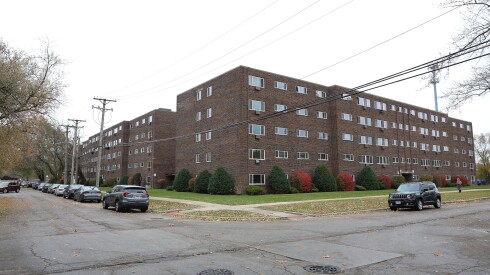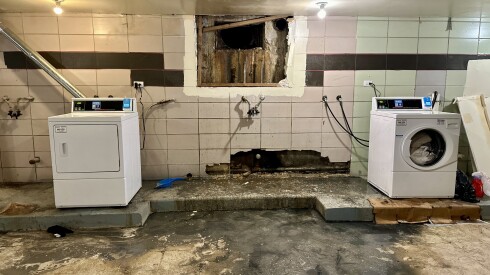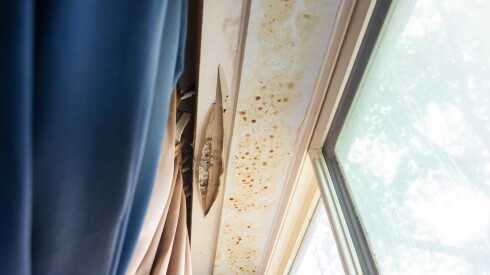In the beloved 1986 film “Ferris Bueller’s Day Off,” the “Sausage King of Chicago” is the title given to a mythical man named Abe Froman. Bueller, a mischievous high school senior skipping school, borrows Froman’s identity to get seated at a ritzy restaurant with his girlfriend and a buddy.
In real life, The Sausage King of Chicago is the name of a company that owns Indian Trails Apartments, a 180-unit subsidized housing development in West Pullman on the Far South Side. The development, once considered a good place to live by longtime residents, is now in flux as it is poised to change hands after years of neglect.
The story of Indian Trails and the real Sausage King of Chicago is about what happened when a corporation led by a pair of out-of-town real estate investors with a penchant for 1980s pop culture bought a property in Chicago. It’s about how wealthy real estate investors purchase buildings where rent is subsidized by the federal government and collect tens of millions of dollars in rental income without providing low-income residents a safe and clean place to live.
‘Everything’s cold’
Jasmine Duckett was born and raised at Indian Trails. After a few years away, she moved back in 2021.
The past three winters, Duckett, 34, said she had to rely on two space heaters provided by property managers to warm her two-bedroom unit.
“In the wintertime, you can’t come out of your [bedroom] because everything else is freezing — bathroom’s cold, hallway’s cold, everything’s cold,” she said.
Some days, she used her stove to heat the place, which exacerbated asthma symptoms for her two young sons, 6 and 2. They have been in and out of the hospital with pneumonia, asthma attacks and febrile seizures.
Duckett said the children have struggled in school because of challenges at home.
“If they’re sleepy or something, nine of 10 times it’s not because of them, it’s because of their living situation,” she said.
The freezing temps are not all Duckett has endured as she’s juggled jobs as a home care aide, forklift driver and UPS assistant. She described broken cabinets that went unrepaired for years, a ceiling that would leak anytime there was rain or snow, roaches crawling everywhere and mold in her apartment and common areas around the building.
Duckett said things have been so bad at times that she and her kids have had to crash at relatives’ homes.
Until recently, she had not heard of her landlord, The Sausage King of Chicago LLC.
The real Sausage King of Chicago
Public records show that the cheekily named company is primarily owned by two investors from California: Alan Smolinisky and Brian Chien-Chih Chen. Two other investors, Robert Budman and Patrick Luke, are “minority and non-controlling” owners of Indian Trails, according to Budman. “We have no knowledge of or involvement in the operations of the property.”
Neither Smolinisky nor Chen responded to requests for interviews. But Smolinisky, in podcast appearances, videos and news reports, has spoken about his life and businesses.
Smolinisky has said he was a student at the University of Southern California in the 1990s when he met Chen, his future business partner. Chen, an immigrant from Taiwan, was Smolinisky’s landlord and owned a real estate business renting apartments to USC students.
Smolinisky, the son of Jewish Argentinian immigrants, said he found Chen a good fit for a business partner.
“Chinese and Jews are very, very similar cultures, very similar worldviews, very similar values around education, around business, around family,” Smolinisky said in an interview with the “Going Big” podcast this past summer.
Smolinisky and Chen formed Conquest Student Housing. They built and renovated apartment buildings around the USC campus, eventually expanding to the University of California at Santa Barbara. At one point, Conquest owned and operated so much of the private housing around USC that the university sued the company in federal court, citing the Sherman Antitrust Act.
The university accused Conquest of using lawsuits to stop other developers from building around campus and even cited how the company referred to itself as the “al Qaeda of USC student housing” because it knew “how to ‘bomb’ competitive projects through litigation,” according to the federal lawsuit, which was settled in 2008.
That year, in a stroke of luck and impeccable timing, Smolinisky and Chen sold their business for $205 million just before the housing market crash.
“And then it was a good time to have a lot of capital, because the whole world was on sale,” Smolinisky said in the podcast. “Any asset anywhere in the world, from stocks to real estate, anything you wanted to buy was in the bargain bin.”
In subsequent years, Smolinisky and Chen scooped up more properties not just in California but all across the United States, naming many of the companies they created to operate them after 1980s and ’90s movies and TV shows.
According to a WBEZ analysis of U.S. Housing and Urban Development records, at least 24 properties across 13 states receiving federal rent subsidies last year were associated with an address for several of Smolinisky’s or Chen’s businesses. In all, the properties received more than $37 million in rental income from HUD last year. Other limited liability companies that owned these buildings had names like We’ll Drive Home Backwards LLC, another line from “Ferris Bueller’s Day Off,” and What Is A Plethora LLC, a line from the 1986 film “The Three Amigos.”
In 2019, Smolinisky also became part-owner — at less than 5% — of the Los Angeles Dodgers, the 2024 and 2025 MLB World Series champions valued by Forbes at nearly $7 billion. In 2022, he partnered with Nike founder Phil Knight in an unsuccessful attempt to purchase the NBA’s Portland Trail Blazers for more than $2 billion. Smolinisky also dabbles in media, having purchased his hometown newspaper, the Palisadian-Post, in 2012.
Asked about his ventures on the “Going Big” podcast, Smolinisky said he is “looking at a number of businesses … watching publicly traded securities and the debt markets every morning, looking for opportunities there.”
Deteriorating conditions
On a rainy day, as two WBEZ reporters walked around Indian Trails with a couple of residents and a housing organizer from the Jane Addams Senior Caucus, tenants gathered around. Each shared photos and stories about their units: a rodent infestation, lack of heat, water shut-offs with no advance notice, flooding, no hot water, maintenance workers showing up out of the blue.
Inside one of the buildings, Barbara Harrison, 58, stood in the hallway across from an elevator with a pool of liquid on the floor that smelled like urine. She’s lived at the development for about 16 years.
“When I first moved here, it was beautiful,” she said. “If you had something [that needed repair] in your apartment, within 24 hours it was taken care of.”
Harrison said Indian Trails’ previous owner — the late Kenneth Ringbloom of southwest suburban Darien — ran a tight ship. Under his ownership, each building had its own live-in maintenance person, she said. Property managers screened potential tenants and were more selective about who they allowed to move in, according to Harrison.
In 2017, a year before he died, Ringbloom sold the complex for $16.6 million to The Sausage King of Chicago LLC, which is owned by Smolinisky and Chen, according to public financing and mortgage documents.
Residents said Indian Trails wasn’t in perfect condition during Ringbloom’s final years, but things deteriorated quickly after the sale to The Sausage King. There were no more maintenance workers living on-site, and Indian Trails was passed from one property manager to the next, residents said.
Dichonda Sandelin, 43, walked through the laundry room in the basement, stepping over a puddle of sewage and pointing to a nonfunctioning bathroom.
“It’s a big plummet from when the original owners [Ringbloom] were here to now,” according to Sandelin, who said that many older tenants no longer rely on property management to make repairs. “They try to fix it themselves, or they have their sons who grew up here fix it for them.”
Residents and organizers said the development’s current property management company, an arm of Smolinisky’s and Chen’s Conquest Housing, has been the least responsive of the property managers Indian Trails has had in recent years.
Indian Trails has been in building court for more than two years for a recurring set of building code violations — broken heating and hot water systems, plumbing and electrical issues, missing or broken smoke and carbon monoxide detectors, missing fire extinguishers — and The Sausage King of Chicago LLC has repeatedly missed deadlines to fix the problems, city of Chicago and court records show.
Even as tenants experienced deteriorating conditions at Indian Trails, The Sausage King continued to take in rent from tenants and the government. As a development under HUD’s Section 8 Project-Based Rental Assistance program, tenants at Indian Trails pay one-third of their income toward rent, and the federal government supplies the rest. The Sausage King of Chicago LLC collected more than $2 million in rent payments from HUD in the last fiscal year, HUD records show.
Multiple plans to renovate the building have never materialized. In late 2021, tenants received a notice informing them that the owners would complete a major renovation of Indian Trails, if they received funding from the Illinois Housing Development Authority. But the owners never completed the application process, according to IHDA spokesperson Andrew Field. State records show the owners submitted another application for state financing the following year, but Field said that application was denied “based on concerns with its financial feasibility.”
‘The Sausage King is trying to cash out’
Housing advocates say profiting off HUD-subsidized buildings without investing in them is part of the business model for many investors.
“Owners can make a choice and put the money into the property,” said Korey Lundin, an attorney with the National Housing Law Project. “Landlords who choose not to … they’re taking our money — literally the federal government’s money — forgoing maintenance and repairs and allowing these properties to rot.”
Lundin said there are “plenty of project-based Section 8 public housing apartments that are just fine. They’re great communities. They’re great places to live in.” He said those places’ owners invest in their buildings or are mission-driven nonprofit developers.
This year, tenants learned The Sausage King of Chicago LLC is selling the building to another California real estate developer, The Transcend Group. Budman, one of the minority and noncontrolling owners of Indian Trails, confirmed the deal is likely to close by the end of the year. WBEZ reached out to The Transcend Group, but the company did not respond to questions.
It’s unclear how much The Sausage King plans to sell Indian Trails for, but it’s likely Smolinisky and Chen will make a hefty profit. A 2023 application for state public financing shows The Transcend Group previously attempted to purchase the development for $27 million — more than $10 million over what The Sausage King paid in 2017.
If the sale goes through, city of Chicago records show The Transcend Group is planning substantial renovations to Indian Trails. At a hearing in October, the Chicago City Council approved a loan — up to $31 million — to remodel apartments, improve common areas and beef up security. Transcend has also requested more in rental subsidies from HUD to offset its costs, according to a notice for tenants obtained by WBEZ.
News of the coming changes is little comfort to tenants, who worry they will be displaced or that the rehab won’t happen at all. Several, including Duckett, voiced their concerns at the City Council hearing.
“We are all for the rehabilitation, of course, but if it’s not backed by a contract ensuring that it’s going to actually happen to us personally, we do not trust it — we have the right to not trust it, honestly,” Duckett said at the hearing.
“The Sausage King is trying to cash out,” said Noah Moskowitz, organizing director with the Jane Addams Senior Caucus. “They’ve mistreated tenants for years. They’ve made a bunch of money doing it, and now they’re trying to cash out without being punished at all.”
Moskowitz said that, though the reign of The Sausage King of Chicago LLC might be ending, “If we don’t talk about what happened, then The Transcend Group [becomes] the next Sausage King.”
In Smolinisky’s podcast interview, he discussed his Argentinian immigrant father and the American dream. He spoke of the wealth he had amassed, about the need to work hard, about trying to make a difference in society.
Smolinsky said he and his wife “are going to give away almost everything,” following the lead of investors like Warren Buffett.
Duckett has a suggestion for where Smolinisky could send some of that money.
“Right here to your people,” she said, rattling off addresses for the buildings in the development. “I would appreciate it if he did invest the money back into the community that really does pay him, from the poorest side of Chicago to L.A.”



